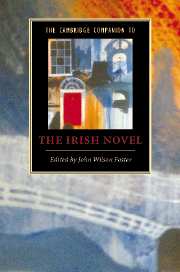Book contents
- Frontmatter
- Introduction
- 1 The novel before 1800
- 2 The national tale and allied genres, 1770s-1840s
- 3 The novel of the big house
- 4 The Gothic novel
- 5 Catholics and fiction during the Union, 1801-1922
- 6 Irish modernisms, 1880-1930
- 7 James Joyce
- 8 Region, realism and reaction, 1922-1972
- 9 The novel in Irish
- 10 Women novelists, 1930s-1960s
- 11 Two post-modern novelists: Samuel Beckett and Flann O’Brien
- 12 Life writing in the twentieth century
- 13 The novel and the Northern Troubles
- 14 Contemporary Irish fiction
- Index
7 - James Joyce
Published online by Cambridge University Press: 28 January 2007
- Frontmatter
- Introduction
- 1 The novel before 1800
- 2 The national tale and allied genres, 1770s-1840s
- 3 The novel of the big house
- 4 The Gothic novel
- 5 Catholics and fiction during the Union, 1801-1922
- 6 Irish modernisms, 1880-1930
- 7 James Joyce
- 8 Region, realism and reaction, 1922-1972
- 9 The novel in Irish
- 10 Women novelists, 1930s-1960s
- 11 Two post-modern novelists: Samuel Beckett and Flann O’Brien
- 12 Life writing in the twentieth century
- 13 The novel and the Northern Troubles
- 14 Contemporary Irish fiction
- Index
Summary
Joyce the modernist
James Joyce (1882-1941) was the international modernist par excellence of his day, yet the question of where his modernism sprang from is difficult to answer. While the conditions of national life during his formative years in Ireland are often regarded as pre-modern, the point is worth observing that the capital in which he was born had one of the most advanced communication systems in Europe when he left it in 1904 - a fact which made its imprint on his novel Ulysses, in the shape of trams and telephones. At that time, Ireland was gripped by a mood of romantic nationalism which did not readily embrace modernist ideas in politics and religion, other than those which confirmed the importance of the 'imagined community' (in Benedict Anderson's famous epithet for the nation); and just as romanticism seemed preferable to realism for nationalists of the day, archaism rather than innovation was the dominant mode for literary revivalists (though that inevitably involved some degree of literary experiment). Joyce turned away from nationalists and revivalists alike, and identified strenuously with a 'movement already proceeding out in Europe' which he identified as 'the modern spirit', before quitting Ireland in 1904 to become part of it.
- Type
- Chapter
- Information
- The Cambridge Companion to the Irish Novel , pp. 133 - 152Publisher: Cambridge University PressPrint publication year: 2006

